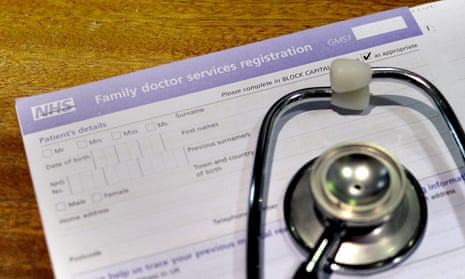Thank you for your report highlighting the government’s grab of GPs’ data (GPs warn over plans to share patient data with third parties in England, 30 May) and the accompanying editorial (The Guardian view on medical records: NHS data grab needs explaining, 30 May). There are even more issues than you cite.
First, the government’s website is disingenuous and misleading. At the top it says patients can opt out at any time; at the bottom it says that when opting out, all existing information will be retained – only new information will not be collected. It states that there is no deadline, but if you opt out after your records have been uploaded, the existing information will not be deleted.
Second, the website’s assurances of anonymity are worthless. Few people realise how easy it is to identify individuals from medical records, even if obvious personal details are removed. If there is enough information to be useful, most patients will be identifiable.
Third, a massive centralised database cannot be adequately secured against serious attack or accidental breach. There are other less risky means of achieving the same ends, as demonstrated by the Covid research cited in the editorial.
Fourth, there is no discussion of what will actually be shared – the data or access to the data. If the data itself is shared, there is no way to control how it is used once it is in the hands of a third party; if only the ability to query the data under monitored conditions is shared, the holder remains in control.
And finally, there is minimal detail on the governance of access to the information, and no mention of any independent body responsible either to the public or to the medical professions.
NHS data is a major potential resource for medical research. However, its use must be carefully managed and controlled, both to retain public trust and to satisfy medical ethics. I strongly support your call for the programme to be scrapped and restarted with suitable technology and safeguards.
Alan Rector
Emeritus professor of medical informatics, University of Manchester
Your editorial said: “Allowing access to NHS data has led to some groundbreaking research, notably helping to identify dexamethasone as an effective Covid therapy.”
This is not relevant to the issue of data scraping from primary care. Patients recruited into the Recovery trial give consent before they are randomised into the study. As you can see on the study’s website, data for the trial is collected within the hospital. Some data may be collected later from NHS Digital or other databases, but patients are able to withdraw consent for collection of their data from other sources at any time.
Irene Stratton
Oxford
The headline on your report implies that all doctors are opposed to NHS Digital’s General Practice Data for Planning and Research scheme itself. In contrast, your article shows that the Royal College of General Practitioners and the British Medical Association were involved in planning the scheme. Their concern is about the way NHS Digital has failed to communicate with patients about it, leaving this to general practitioners, who have been poorly informed themselves.
Explanations are clearly needed, especially about the handling of sensitive data and the projects for which permission can be obtained, as social media is now increasingly full of misinformation. NHS Digital and Health Data Research UK seem to be disinclined to provide the explanations needed, GPs are too busy and Matt Hancock could not be trusted. In this vacuum, why doesn’t the Guardian commission some of the researchers hoping to use the data to explain their research and how it will benefit the public, especially as the first example that NHS Digital cites is to “Research the long-term impact of coronavirus on the population”?
Alison Macfarlane
Professor of perinatal health, City, University of London
I’ve been invited by our clinical commissioning group to an “understanding and using patient data workshop” (GPs urged to refuse to hand over patient details to NHS Digital, 1 June). Date of meeting: 29 June. Date of deadline for opting out my medical record from the big upload: 23 June.
Robert Oulton
Godalming, Surrey
For those readers who wish to opt out of the NHS data grab (The Tories have worked out how to pull off an NHS data grab: do it during a pandemic, 5 June), the NHS Digital website will send you round in circles. Just go to the web page medconfidential.org/how-to-opt-out and you will find the link instantly. The completed form can be handed in, emailed or posted to your GP surgery by the 23 June deadline.
Celia Berridge
Rodmell, East Sussex
Have an opinion on anything you’ve read in the Guardian today? Please email us your letter and it will be considered for publication.
